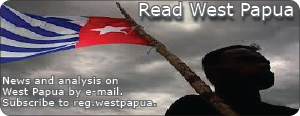Speech by ETAN's Chris Lundry at December 14, 2012 Freeport Protest
My name is Chris Lundry, and I am a
research prof at ASU. I work in Indonesia, Timor Leste and Southeast
Asia. I have been a member of the East Timor and Indonesia ActionNetwork since 1994. I have worked in and written about the situation
in West Papua, which is what I want to talk about today. I am not
surprised, however, that we have representatives from all over
Arizona here to protest conditions at Freeport in place such as
Bisbee. Freeport has a diabolical history in Indonesia, and
apparently it doesn’t much care for workers here in Arizona either.
I would like to take a few minutes to speak about Freeport’s
despicable behavior in Indonesia.
Freeport came to Indonesia to exploit
gold and copper discovered in the remote region of West Papua, and
signed a contract in 1967 with the brutal Major General Suharto, who
had come to office two years prior after a coup d’etat in which
hundreds of thousands of people were killed, suspected of being
leftists or communists, and tens of thousands more were imprisoned
without trial. It was the height of the Cold War, the US was
embroiled in Vietnam, and we were pleased that we had a new ally in
Southeast Asia. So we overlooked the mass murder and extrajudicial
executions, and Suharto became our guy in the region.
The region of West Papua, where
Freeport operates the world’s largest open pit gold mine and second
largest open pit copper mine, had been embroiled in political
intrigue of its own. Promised independence by the Dutch before
Indonesia won its revolution, West Papua was instead taken over by
Indonesia in 1962; the Dutch fled, and the UN signed off on the
takeover. West Papuans played almost no role in the negotiations
between the Dutch, the Indonesians, and the UN over the fate of the
territory. US President Kennedy said at the time that it would be
better to appease mammoth Indonesia than worry about the fate of
700,000 living in the “Stone Age.” The Indonesians persecuted,
tortured and killed West Papuans who dared to aspire to independence,
and began flooding the region with people from other islands in
Indonesia to water down the population. Freeport signed its contract
in 1967 and dictated the terms of the agreement; Suharto skimmed 10
percent of Indonesia’s take. The West Papuan people, once again,
were not consulted but were rather pushed off their own land. The
Amungme Tribe, who lived where the mine was developed, opposed the
economic and environmental violence that had been wreaked upon them.
The mountain was their spiritual mother, and Freeport had come in,
cut off her head, dug into her heart, and poisoned her blood; the
river that runs from the mountain to the sea is now a dead zone due
to the poisons emitted by Freeport.
A sham referendum was held in 1969 –
still at the height of the Cold War, and the US and the West
supported it, and the UN signed off on it. 1200 West Papuans, many at
gunpoint, were forced to agree to integration. West Papuans were
denied a one person – one vote referendum as they demanded, and
those who spoke out were tortured or murdered. Once again, the voice
of the West Papuans was silenced.
Freeport operates in the region with
impunity. It has been implicated in murder and torture, and pays the
Indonesian police and military to act as a private militia on its
behalf in order to guarantee profits before people. Anyone who
opposes Freeport’s policies risks imprisonment, torture, or
disappearance. The Indonesians go along with it, because Freeport is
the largest foreign contributor to the Indonesian tax base.
Despite recent moves toward
democratization in Indonesia, the region of West Papua remains an
Indonesian colony. Papuans are exploited in every way imaginable.
People from other regions of Indonesia own the businesses, make the
money, and govern the territory. Justifications for this are usually
housed in racism: Papuans are stupid, Papuans are lazy. My experience
tells me otherwise: Papuans are exploited, outgunned, and subjected
to fear, intimidation and violence.
Let me emphatically state that I do not
claim to speak on behalf of the West Papuan people. Rather, I support
the right of the West Papuan people to speak for themselves, and to
be able to live lives free of exploitation and violence. Freeport
McMoran continues to be an obstacle to that goal. 45% of the
company’s profits come from Indonesia, and yet its workers are paid
$2-$3 a day, among the lowest wages in the world for mine workers. In
case you’re wondering, Freeport made 4.5 billion dollars in profits
last year. Last Year, Richard Adkerson, the CEO of Freeport, broke
Arizona’s executive pay record and took home 82 million dollars,
according to the Arizona Republic.
Last Year the United Steelworkers, in
solidarity with workers in West Papua, submitted a formal complaintto the US Department of Justice, urging them to investigate
Freeport’s violations of the foreign Corrupt Practices Act for the
bribery of Indonesian security forces. Freeport has blood on its
hands and can well afford to pay its workers better. Instead it
chooses to use violence, corruption and intimidation to increase
profits. And now we’re seeing Freeport’s exploitation up close in
Bisbee. Shame on Freeport! Workers’ rights are human rights! As an
American and an Arizonan, I stand in solidarity with the oppressed
people of Papua, and oppressed workers everywhere. No blood for
copper, no blood for gold!
Read the West Papua Report
Statement for Phoenix Occupy Freeport Demonstration (February 2012)
Statement on the operations of the Freeport McMoran Mine in West Papua, to the U.S. Senate hearing on Extracting Natural Resources: Corporate Responsibility and the Rule of Law
